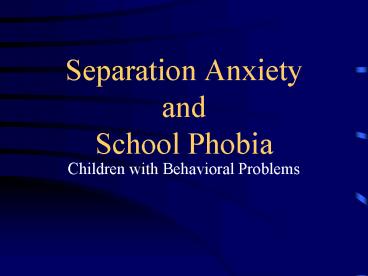Separation Anxiety and School Phobia - PowerPoint PPT Presentation
1 / 22
Title:
Separation Anxiety and School Phobia
Description:
Stomach ache. Cramps. Vomiting. Muscle aches. Palpitations. Warning Signs ... Stomach aches. Dizziness. School Related Triggers. Fear of failure. Teasing by ... – PowerPoint PPT presentation
Number of Views:3833
Avg rating:3.0/5.0
Title: Separation Anxiety and School Phobia
1
Separation Anxiety andSchool Phobia
- Children with Behavioral Problems
2
What is Separation Anxiety?
- It is an anxiety disorder consisting of excessive
anxiety beyond that expected for the childs
developmental level related to separation from
the attachment figure.
3
Emotional Symptoms
- Unrealistic worries about the safety of loved
ones. - Reluctance to fall asleep without being near a
primary attachment figure. - Excessive distress
- Nightmares
- Homesickness
4
Physical Symptoms
- Dizziness
- Nausea
- Stomach ache
- Cramps
- Vomiting
- Muscle aches
- Palpitations
5
Warning Signs
- Child is inconsolable for more than two weeks
- Repeated physical complaints in the morning.
- Interferes with activities that other children
are doing. - School refusal or school phobia.
6
Causes
- Tiredness
- Minor or major illness
- Changes in the household routine
- Family changes
- Change in caregiver or routine at daycare, or
school.
7
Treatment
- Behavioral- Counseling for the parent and child.
The child can also benefit from individual play
therapy. The parents should develop a consistent
morning plan to support the child in going to
school.
- Medication- For children who are resistant to
behavioral modification and psychotherapy there
is imipramine or SSRIs which have been proven to
help with separation anxiety.
8
What Can We Do?
- Teacher should introduce self to child and invite
the child to play with the toys and have a snack. - Offer to have the parents stay awhile.
- Suggest the parents try role playing with the
child to rehearse the separation. - Establish a ritual for the parent leaving the
child. - If child is in absolute panic, ask the parent to
stay longer until the child is calmed. - Never criticize the child for feeling sad or
anxious.
9
What is School Phobia?
- Also known as Scolionophobia, fear of school, and
separation anxiety - It is a symptom of anxiety disorder in childhood.
- Identified as when a child stays home from school
or misses a lot of school because of their fears.
10
What is School Phobia contd
- In reality the fear of school faced by these
children is usually anxiety over having to leave
home and is better termed separation anxiety - The children generally feel fear about leaving
the safety of their homes and they often lack the
self-confidence that comes from handling lifes
normal stresses without the help of their parents.
11
Characteristics
- Refusing to go to school.
- Overly clingy.
- Constant thoughts and fears about safety of self
and parents. - Shadowing of mother and father around house.
- Having tantrums when forced to go to school.
12
Continued.
- Having trouble when going to sleep.
- Extreme worries about sleeping away from home.
- Nightmares.
13
Anxiety Symptoms
- Crying
- Headaches
- Diarrhea
- Feeling faint
- Hyperventilation
- Vomiting
- Rapid heart beat
- Shaking
- Sweating
- Stomach aches
- Dizziness
14
School Related Triggers
- Fear of failure
- Teasing by other children
- Threats of physical harm
- Existing learning difficulties or disabilities
- Social problems
- Unsafe neighborhoods or schools
- Perceptions that school personnel and teachers
are mean. - Starting a new school
15
Non-School Related Triggers
- Home problems
- Fear something terrible will happen at home while
they are at school - Stress from transitioning
- Preference to stay home because they can have
parental attention. - Unrealistic worries that family members will be
harmed or that a parent will be unable to handle
a catastrophe if the child is not there to help.
16
Statistics
- 1.3 of teenagers aged 14-16 years experience
separation anxiety/ school phobia - Between 4.1 and 4.7 of children aged 7-11 years
experience separation anxiety/ school phobia. - 3.9 of children aged 12-14 experience separation
anxiety/ school phobia - The average age for the onset of school phobia is
7.5 years.
17
How Long Will It Last
- Important that school phobia is dealt with a soon
as possible. - Can improve dramatically within a few weeks if
attendance is enforced. - If you do not require the child to attend school
every day the physical symptoms and the desire to
stay home will become more frequent and their
anxiety about leaving their parents and home will
become more intense.
18
What Can We Do?
- Identify the cause of the anxiety (school or home
issues). - If possible, be in contact with the parents about
family issues. - Plan a customized approach to help the child.
- Help the child to learn how to relax, and develop
better coping skills. - Be consistent with routines.
- Be reassuring that their family will be fine, and
they will be able to see them soon.
19
Continued.
- Identify things the child can look forward to the
next day. - Encourage the child to explore social situations.
20
Other Treatment Options
- Behavior therapy- The individual learns to cope
with difficult situations, often through
controlled exposure to them. - Cognitive Therapy- The individual examines
feelings and learns to separate realistic from
unrealistic thoughts. - Cognitive-Behavior Therapy- The individual learns
recovery skills that are useful for a lifetime.
21
Continued.
- Relaxation Techniques- Helps individuals develop
abilities to cope with the stresses that
contribute to the phobia. - Neuro-Linguistic Programming- Views school phobia
as a result of programs or constructs that we
have created that dont work well. This approach
reprograms them.
22
Resources
- www.Emedicine.com
- www.ncpamd.com
- www.phobics-awarenes.org
- www.med.umich.edu
- www.amazon.co/uk/school-phobia-attacks































